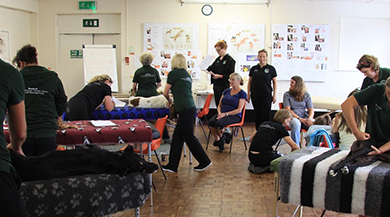Who should attend?
- Adults wanting a career change
- Veterinary professionals eg: vets, vet nurses
- Hydrotherapists
- Physiotherapists
- Chiropractors
- Behaviourists
- Trainers
- Dog groomers
- Those who have attended other massage courses and have skills gaps
When completing the online application, you can choose to attend a 1 day workshop with us, or watch the online DVD. We train from the ground up.
What will be covered?
12 Written Modules –
Anatomy & Physiology including; systems of the body, soft tissue pathology, orthopaedic pathologies, business awareness and clinician skills.
18 Practical Days -
10 days physically with us in the classroom, 4 half days of gross anatomy online sessions, therapeutic canine handling and empathy, as well as multiple other lectures and tutorials throughout the course totalling a further 6 days.
Our expert tutors consist of successful practising therapists who work in private practice and at veterinary surgeries, as well as a Senior Vet Nurse with 25 years’ experience, who is also a Clinical Canine Massage Therapist. All our tutors have completed the course themselves. We work authentically and have a vast amount of experience in the animal care and complimentary therapies industry to provide you with the finest learning experience you can get. After all, it’s the dogs you will be working with that deserve the best, we are sure you’d agree, and with us, that’s exactly what you receive.
60 Techniques across 4 disciplines of Massage & Thermotherapy -
Myofascial release (indirect & direct approach), remedial sports massage including trigger point therapy, deep tissue massage, Swedish massage with adaptations and variations to suit yours and the dogs biomechanics. You will also learn a range of thermotherapy techniques to assist in treatment.
Hands off evaluation, dynamic gait analysis and static postural analysis –
Learn how to read the body and create meaning to enable you to synthesise treatment plans and re-evaluate results.
The exclusive Lenton Method™ -
The only style of canine massage backed by clinical research as published in the Vet Record by the British Veterinary Association.
Online Companion School –
We have built a comprehensive online school to assist you with your studies, so when you aren’t in the classroom you can practice at home. Whilst you are studying your modules and attending practical sessions, our online companion school has been developed to help bring it all to life for you and quite simply is an amazing comprehensive tool that we are incredibly proud to offer.
An Online Video Library -
Including preparatory massage techniques to assist you to establish a strong foundation ready for the in person practical sessions, where we continue building on this to develop your skills with advanced massage, the Lenton Method™ and myofascial release
• Exercises
• Quiz’s
• Resources
• Gross Anatomy videos with Natalie
• Technique demonstrations you can visit time and time again
Regular support sessions in Year 1 & 2 –
Every 4-6 weeks we have Zoom sessions with our students to check in with your progress, answer your questions and work with the tutor team to improve your success.
Separate community area away from Facebook on our education platform to build group coherence away from the usual social media platforms.
Clinic Days –
Under supervision from our tutors, you will be treating real visiting clients with real soft tissue and orthopaedic concerns during our clinic days, providing you with expert coaching and application of techniques preparing you ready for practice.
Veterinary & Paraprofessional Communications –
Learn how to work with vets, practices and other therapists. You’ll also receive coaching in how to write veterinary reports so you can represent yourself, and our therapy, with confidence and professionalism.
Working to gold practice standards –
We pride ourselves on teaching safe practice, so you will receive tutoring on canine behaviour and presentation of symptoms, safe examination, and safe working practice for handling live animals, including adherence to National Occupational Standards and the Animal Welfare Act 2006. Importantly, we also teach you when you can’t help and how to determine when your canine patient needs referring back to the vet for further vet-led diagnostics.
Post Course Support –
Upon successful completion of the course, you have the opportunity to join the Canine Massage Guild (exclusive to our graduates) and attend CPD with us, which is limited only to Canine Massage Guild members, including courses such as ‘Facilitated Stretching for the Canine Patient’, ‘Manual Lymphatic Drainage’, ‘Advanced Myofascial Release for the Ventral Aspect of the Canine (visceral release)’, ‘Neuromuscular Facilitation’, ‘Advanced Deep Tissue’, ‘Skills Review Days’. ‘Structural Series Advanced Myofascial Release’ and much more.
We continue to support you after the course has finished with further training, as well as peer and business support from the renowned Canine Massage Guild, attend shows, get listed on the official Therapist Register, business start-up package, web presence and lots more.



